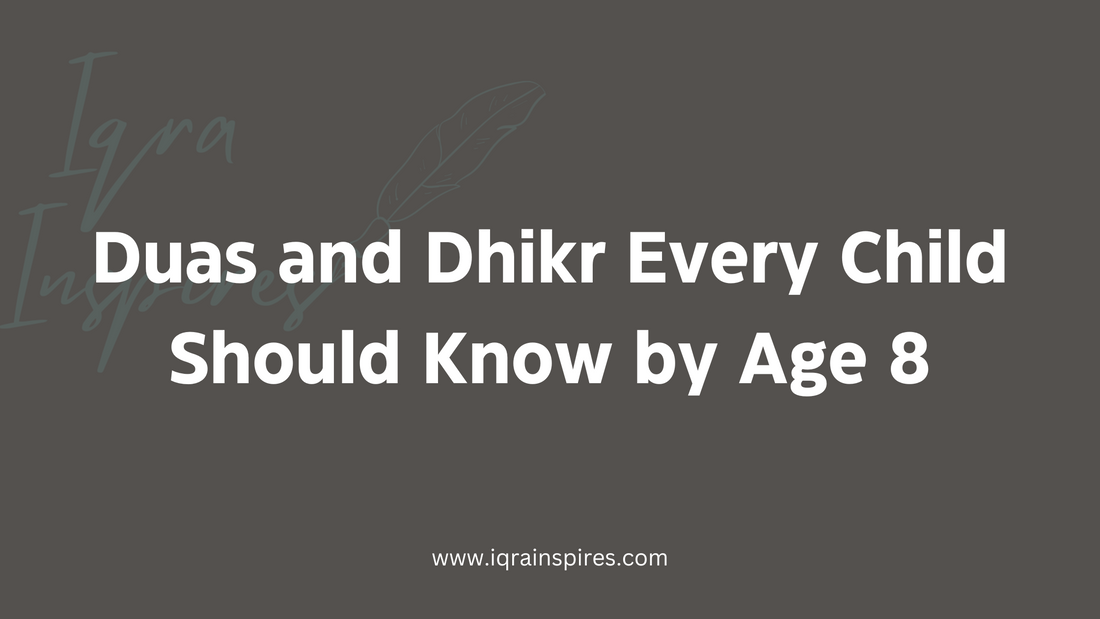
Duas and Dhikr Every Child Should Know by The Age of 8
Share
Kids can memorize the entire theme song of their favorite cartoon, but when it comes to learning basic duas, suddenly their memory “doesn’t work.” Sound familiar?
Well, the good news is, children are natural sponges, and if we introduce them to dua and dhikr in a fun way, they’ll absorb it effortlessly.
By the age of 8, a child should ideally have a small collection of duas and dhikr memorized by heart. And, here are the essential ones to start with:
1. The Last 10 Surahs From the Quran
By the time they turn 8, every child should have memorized at least the last 10 surahs of the Quran. These short yet powerful chapters will not only help them in Salah but will also serve as daily protection and a means of immense reward.
📖 The Last 10 Surahs:
Surah Al-Fil (105) – The story of Allah’s power over an army of elephants.
Surah Quraysh (106) – A reminder of Allah’s blessings and provision.
Surah Al-Ma’un (107) – The importance of kindness and helping others.
Surah Al-Kawthar (108) – A promise of abundant reward in Jannah.
Surah Al-Kafiroon (109) – A declaration of firm faith in Islam.
Surah An-Nasr (110) – The victory of Islam and gratitude to Allah.
Surah Al-Masad (111) – A lesson on arrogance and its consequences.
Surah Al-Ikhlas (112) – The foundation of Tawheed (Oneness of Allah).
Surah Al-Falaq (113) – Protection from harm and evil.
Surah An-Nas (114) – Seeking refuge in Allah from whispers of Shaytan.
📌 How to Teach Them:
Make it part of their bedtime routine; recite one surah each night before sleep.
Reward progress with small incentives (stickers, extra playtime, or a special treat).
Use visual aids, flashcards, apps, or even simple hand gestures to associate meanings with surahs.
2. Ayat al-Kursi
Ayat al-Kursi is one of the most powerful verses in the Quran. It is a shield against harm, a source of blessings, and a key to strengthening faith, (Surah Al-Baqarah, 2:255).
When Should Kids Recite It?
✅ Before sleeping, for protection through the night.
✅ After every Salah, as a Sunnah practice.
✅ When feeling scared or anxious, for comfort and safety.
📌 Parent Trick: Recite Ayat al-Kursi with them every night as part of their bedtime routine.
3. Daily Dhikr
These short phrases are easy for kids to memorize and say throughout the day:
🔹 SubhanAllah (Glory be to Allah)
🔹 Alhamdulillah (All praise be to Allah)
🔹 Allahu Akbar (Allah is the Greatest)
🔹 La ilaha illa Allah (There is no god but Allah)
4. Tasbeeh After Salah
The Prophet (PBUH) taught us to say after every Salah:
🔹SubhanAllah – 33 times
🔹Alhamdulillah – 33 times
🔹Allahu Akbar – 34 times
📌 Make It Fun: Get them their own colorful tasbeeh counter or app!
5. Essential Duas for Everyday
🔹 Before Eating:
"Bismillah wa barakatillah"
(In the name of Allah and with His blessings.)
🔹 After Eating:
"Alhamdulillahilladhi at’amana wa saqana wa ja‘alana minal muslimeen"
(All praise is due to Allah who fed us, gave us drink, and made us Muslims.)
🔹 Before Sleeping:
"Allahumma Bismika amutu wa ahya"
(In Your name, O Allah, I die and I live.)
🔹 Upon Waking Up:
"Alhamdulillahilladhi ahyana ba‘da ma amatana wa ilayhin-nushur"
(All praise is due to Allah who gave us life after death, and to Him is the return.)
🔹 When Feeling Scared or anxious:
"Hasbunallahu wa ni‘mal wakeel"
(Allah is sufficient for us, and He is the best disposer of affairs.)
📌 Story Time: Share how Prophet Ibrahim (AS) said this when he was thrown into the fire, and Allah saved him!
🔹 Sneezing & Responding
When sneezing: “Alhamdulillah”
When hearing someone sneeze: “Yarhamukallah” (May Allah have mercy on you)
Response back: “Yahdikumullah wa yuslihu balakum”
🔹 "La ilaha illa Allah"
The foundation of faith, the best dhikr. Teaching them this phrase is like giving them the key to Jannah!
The goal isn’t just memorization, it’s making dua and dhikr second nature to them. Keep it light, make it fun, and model these habits yourself.
Before you know it, they’ll be reminding you to say “Bismillah” before your morning coffee!



